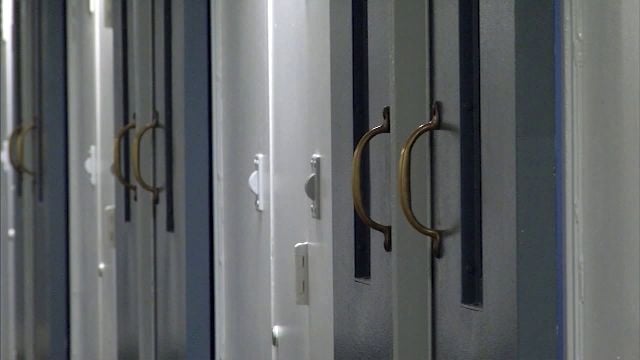14 face additional charges in alleged racketeering conspiracy at ECI

A federal grand jury has returned two indictments charging 14 defendants with racketeering at the Eastern Correctional Institution in Westover.
The indictments charged six correctional officers, four inmates and four outside "facilitators," for their alleged roles in the conspiracy, which involved paying bribes to correctional officers to smuggle contraband, including drugs, tobacco and cell phones into the prison.
The indictments were returned on Tuesday and made public on Wednesday. The indictments were announced by Acting U.S. Attorney for the District of Maryland Stephen M. Schenning; Special Agent in Charge Gordon B. Johnson of the Federal Bureau of Investigation, Baltimore Field Office; and Secretary Stephen T. Moyer of the Maryland Department of Safety and Correctional Services.
The indictments say that Eastern Correctional Institution is the largest state prison in Maryland, it has been operating for 30 years near Westover in Somerset County, on Maryland's Eastern Shore. E.C.I. is a medium security prison for men built as two identical compounds (East and West) on 620 acres, and housing more than 3,300 inmates. The East and West Compounds are further divided into Housing Units, one through four in the West and five through eight in the East.
The first indictment covers the West Compound at E.C.I. and charges six defendants, including two correctional officers, one E.C.I. inmate and three outside suppliers. The second indictment covers the East Compound of E.C.I. and charges eight defendants, including four correctional officers, two inmates and two outside suppliers.
The other indictments allege that from in or about 2014, until in or about October 5, 2016, the Correctional Officers smuggled contraband into E.C.I., including drugs, cell phones, pornographic DVDs, and tobacco. The items were distributed by inmates, and the Correctional Officers allegedly managed the proceeds of the sales.
The "going rate" for a Correctional Officer to smuggle contraband into E.C.I. was reportedly $500 per package, even though some Correctional Officers charged more and some Correctional Officers charged less.
According to following indictments, inmates and suppliers paid Correctional Officers for smuggled contraband in cash, money orders, and through Pay Pal. Inmates allegedly used contraband cell phones to pay Correctional Officers directly using Pay Pal from within E.C.I. Inmates also reportedly received payments from other inmates for contraband through Pay Pal often with the help of outside suppliers.
The indictments allege that the defendants conspired to smuggle and traffic in drugs within E.C.I., including marijuana and synthetic cannabinoids or K2, buprenorphine, commonly referred to as "Suboxone" and other contraband including cell phones, pornographic videos and tobacco, in order to expand their criminal operations.
Inmates allegedly acted as both wholesalers and retailers of contraband and in the process made profits that far exceeded the profits that could be made by selling similar drugs on the street. For example, defendant inmates could buy Suboxone strips for three dollars each and sell them inside E.C.I. for $50 each, or for a profit of more than 1000 percent.
According to other indictments, although correctional officers and other E.C.I. employees had to pass through security screenings at the entrance of E.C.I., defendant correctional officers could hide contraband. Further, correctional officers reportedly took breaks during shifts and returned to their cars to retrieve contraband.
Once the correctional officers had smuggled contraband inside, they reportedly delivered it to inmates in their cells; clerks offices, which were private officers within each housing unit where an inmate clerk worked; the officers dining room where officers could interact with inmate servers and kitchen workers; and pre-arranged "stash" locations like staff bathrooms, storage closets, laundry rooms, and other places where contraband could be hidden and then later discovered by inmates.
The indictment shows that defendants who were members of gangs sought and received contraband and payment from inmates who were not members of gangs to receive protection for their contraband trafficking activities.
Each defendant faces up to 20 years in prison for the racketeering conspiracy, and for conspiracy to distribute and possess to intent to distribute drugs. An indictment is not guilt and each person is presumed innocent unless and until proven guilty.
The Acting U.S. Attorney expressed appreciation to Secretary Moyer whose staff began the E.C.I. investigation and who has made the full resources of the D.P.S.C.S. available to help the three-year investigation.
United States Attorney Schenning commended the FBI, U.S. Postal Inspection Service, Department of Public Safety and Correctional Services, the Baltimore Police Department, and Maryland State Police for their work in the investigation. Mr. Schenning thanked Assistant U.S. Attorneys Leo J. Wise, Robert R. Harding, and Daniel C. Gardner, who are prosecuting this Organized Crime Drug Enforcement Task Force case.
West Compound Indictment
Correctional Officers:
- Rozlyn Bratten, 32, Snow Hill
- Kimberly Rayfield, 38, Crisfield, .
Inmates:
- Ternell Lucas, age 43;
- Demario King, age 38.
Facilitators:
- Leondrus Higgins, 30, Salisbury
- Chavia Savage, 24, of Salisbury and Baltimore.
East Compound Indictment
Correctional Officers:
- Sherima Bell, age 38, of Pocomoke,
- Jocelyn Byrd, age 40, of Salisbury;
- Jessica Vennie, age 28, of Crowley, Texas;
- Robert Waters, age 33, of Salisbury.
Inmates:
- Sean Smith, age 26;
- Alvin Williams, age 36.
Facilitators:
- Eugene Bowen, age 52, Salisbury;
- Dameshia Vennie, age 35, West Palm Beach, Florida.


